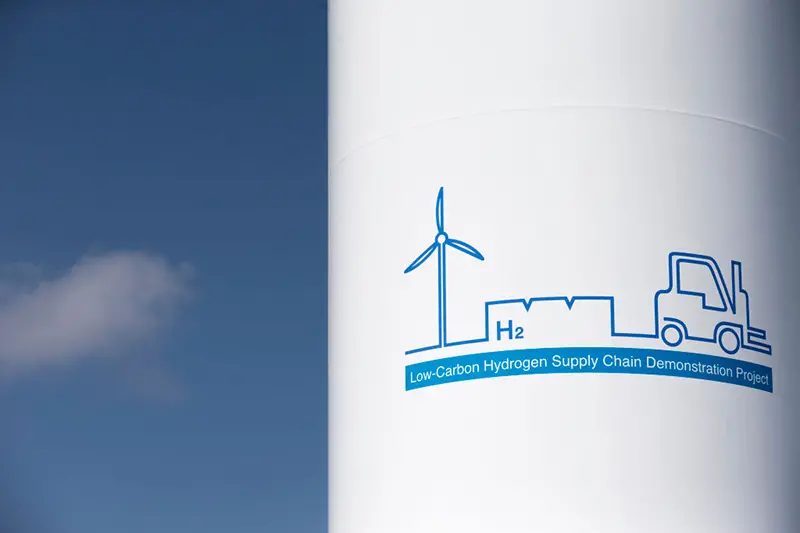PHOTO
ABU DHABI- The UAE with its abundant solar power has the potential to become an exporter of renewable hydrogen to Europe in the future, a top European Union (EU) official told Emirates News Agency (WAM).
"What is important for us, in addition to scaling up renewable hydrogen in the EU, is to create a global hydrogen market that would facilitate production and trade. For this, we need other pioneers across the globe who prioritise renewable hydrogen, and UAE with its abundant solar power and interest in hydrogen has much potential in this field," Kadri Simson, European Union Commissioner for Energy, said when asked about the potential EU-UAE cooperation in this sector.
"I understand that the UAE is currently working on its very own hydrogen strategy, something that the EU put forward last year. We are of course happy to share our experience, also in the context of our upcoming proposal on new hydrogen market rules that we will adopt this year." "It cannot be excluded that in the future, the UAE would export renewable hydrogen to Europe, to meet the growing demand," added the official who was on an official visit to the UAE recently.
UAE’s hydrogen initiatives Simson’s comments are relevant in the wake of major initiatives announced by the UAE this year, aiming a leading global role in green hydrogen. The latest one was announced on Wednesday by His Highness Sheikh Mohamed bin Zayed Al Nahyan, Crown Prince of Abu Dhabi and Deputy Supreme Commander of the UAE Armed Forces, on creating a global clean energy powerhouse intended to spearhead the drive to net-zero carbon by 2050.
He said Abu Dhabi National Energy Company PJSC (TAQA), Mubadala Investment Company (Mubadala) and Abu Dhabi National Oil Company (ADNOC) will partner under the Abu Dhabi Future Energy Company (Masdar) brand, consolidating their combined efforts in renewable energy and green hydrogen.
Wednesday’s announcement consolidates the efforts of all three partners, combining their renewable energy and green hydrogen portfolios into Masdar. The new Masdar partnership builds on the creation in January 2021 of the Abu Dhabi Hydrogen Alliance, comprised of Mubadala, ADNOC and ADQ (TAQA’s majority shareholder) and the launch on 17th November of a new global renewable energy venture between ADNOC and TAQA.
Potential of hydrogen The EU official pointed out that hydrogen is an energy carrier, which can help decarbonise sectors where it is not easy to do – for example heavy industry and some modes of transport. "It can also be used as a storage solution for renewable energy, something that is becoming increasingly important as we move towards net zero." At the EU Energy Day at the Expo 2020 Dubai, "we selected renewable hydrogen as the focus of our high-level event, as we see significant potential in renewable hydrogen globally and the EU hydrogen policy has a clear external dimension. International cooperation is a big part of our energy policy, so it’s important for us to reach out and discuss issues," she explained.
EU-UAE cooperation in net zero, Methane Pledge About the potential of EU-UAE cooperation in other areas of energy, the official said, "We now have a common commitment in the EU and the UAE to become climate neutral by 2050. I am very interested in seeing the concrete plans to implement this ambitious agenda and I hope this serves as inspiration for those countries in the region who don’t yet have net zero as a target." She is also very pleased that the UAE signed up to the Methane Pledge launched by the President of the European Commission, Ursula von der Leyen, and the US President, Joe Biden, to cut 30 percent of dangerous methane emissions globally by 2030, compared to 2020 levels.
"This is a priority area for the EU, and we are interested in working very closely [with the UAE] on this. I hope the UAE will take this topic forward as a host of COP28. Other promising areas for cooperation are energy efficiency, renewable energy – especially solar," Simson explained.
EU renovating buildings to save energy "Since then, we have launched several initiatives to make our buildings more sustainable and efficient. We have proposed to extend carbon pricing to the building sector, which would motivate a switch to renewable energy sources. The benchmark we have set is 49 percent renewables in buildings by 2030 and the use of renewable energy in heating and cooling should increase by 1.1 percentage points each year." Simson said her recent UAE visit was very useful and interesting as she had the opportunity to have high-level discussion on energy policy with different stakeholders and to visit several pavilions at the Expo 2020 Dubai where the focus was on sustainability and renewable energy.
"It was educational and gave me renewed hope for the future," she said.
© Copyright Emirates News Agency (WAM) 2021.





















